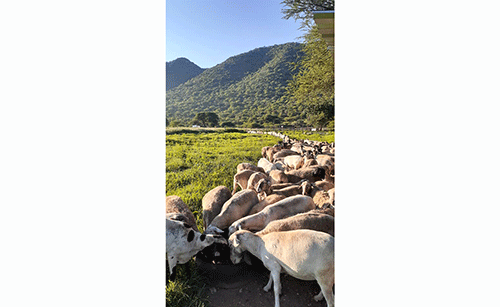OTAVI – While poverty has forced the destitute and vulnerable to resort to scavenging at dumpsites in many towns and settlements, Otavi is hell-bent to address food security problems at household and national levels.
In fact, Otavi is determined to fill the food insecurity gap at both local and national levels.
According to national statistics, about 659 000 Namibians are food-insecure and require humanitarian assistance to reduce food gaps and prevent acute malnutrition.
Food security is defined as ‘’access by all at all times to adequate safe and nutritious food for a healthy and productive life’’.
Otavi, alongside Grootfontein and Tsumeb, constitutes Namibia’s maize triangle, a relatively high-rainfall area with a flourishing agriculture sector, centred mainly around the cultivation of maize and lucerne – some of which is under irrigation.
Otavi mayor Isaac Hoaeb said the town has plans to provide a solution to hunger and poverty.
Council has recently purchased a farm (De Klerk) and allocated 70% (21 hectares) of the agricultural land to the youth, and 30% (nine hectares) went to pensioners.
According to him, the town council will empower the youth who want to venture into the formal agricultural sector by either becoming entrepreneurs, who create jobs or by being employed by commercial farmers.
He said the aim of this agricultural hub dream is to ensure food security in the town.
The senior citizens will be trained in backyard gardening, chicken farming and horticulture.
“This is really to break the dependency. We want to break the dependency of our people on the government’s drought relief programme. We want to produce our own food. We believe that community development is when we find out what our challenges are and find solutions to our own challenges. We want to provide a solution to hunger and poverty. We want to become the food basket of the region and the country,” Hoaeb noted.
Otavi is strategically located with an abundance of underground water sources and fertile land.
Therefore, council wants to capitalise on that strength by becoming an agricultural hub.
The mayor is himself an example of an urban agriculturist, as he started a horticulture project at his house, producing various fresh produce, such as cabbage, tomatoes and onions, among others.
“Otavi is going to become an urban agricultural hub. It will become the food basket of the maize triangle and Namibia as a nation. As we all know, by virtue of its strategic location, Otavi is already supplying the nation with vegetables and fruits. We want to help the poor and vulnerable people in Otavi to cope with food scarcity and hunger by growing crops in backyards and developing the Otavi town council farm into a horticulture hub,” he said.
Otavi assists farmers to auction off their animals locally through their associations.
The farmers sell their fruits and vegetables to local SMEs and vendors.
Moreover, the farmers sell their maize produce at the Namib Mills depot.
Council has enough town land that farmers can obtain by applying to set up an abattoir or cool storage facilities.
He said the urban agricultural project entails a self-sustaining town for the integration of agriculture livelihoods and supporting commercial trade.
“The urban agricultural project will first create income opportunities and grow the local economy before broadening its horizons to export products to national and international markets,” he said.
Hoaeb is assisting Otavi Primary School to extend its garden with his gardening expertise.
The council has reached out to corporates, such as the B2Gold as well as Ohlthaver and List (O&L) to assist in establishing the council’s horticulture project at its farm and help with technical assistance, such as training.
Namib Mills operates as a milling facility as well as a depot – and currently employs over 60 staff members in the town.
The mill generates 13.5 tons of maize per hour.
– anakale@nepc.com.na


